Hundreds of alleged college students in Uganda organized a march on Wednesday to thank President Yoweri Museveni, the longtime strongman leader of the country, for signing the “Anti-Homosexuality Act” into law last week.
Videos of the assembly showed men in suits loudly chanting, dancing, and holding up signs with slogans such as “to hell with homosexuality!” Local outlets in Uganda reported that the crowd chanted, “we don’t want your pro-gay money,” an apparent message to the United States and other Western states after leftist President Joe Biden announced he would reconsider sending humanitarian aid to the country in response to the law.
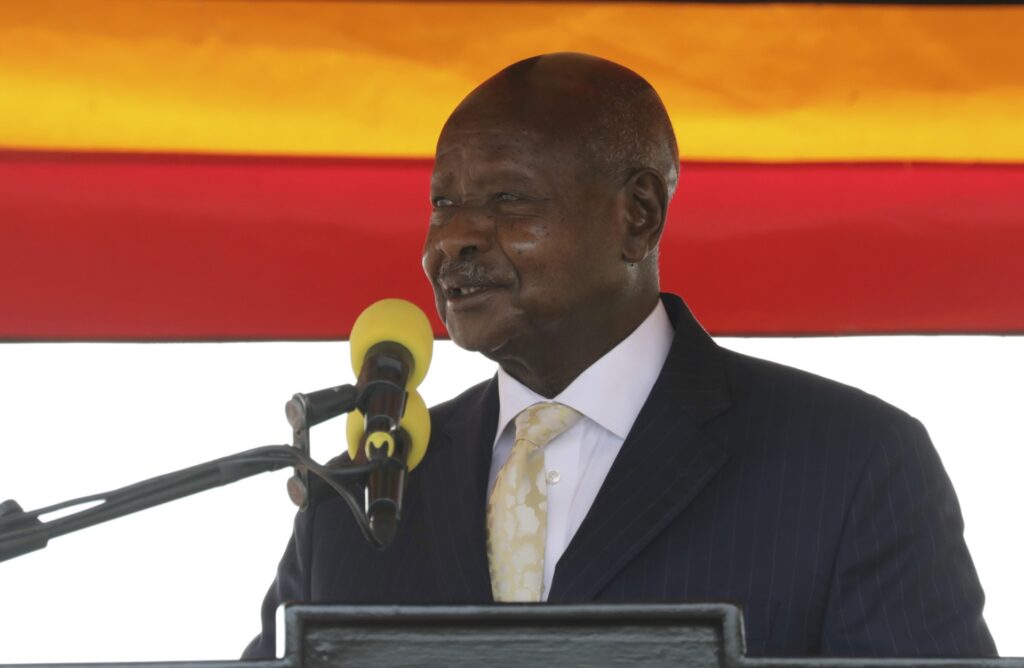
Ugandan President Yoweri Museveni speaks during the 60th Independence Anniversary Celebrations, in Kololo, Uganda, on October 9, 2022. (AP Photo/Hajarah Nalwadda)
While organizers of the march claimed to be a coalition of students acting independently of the government, the leader of the march is a member of Museveni’s party, the National Resistance Movement. Museveni is an authoritarian who for decades has disappeared, killed, imprisoned, tortured, or otherwise silenced political opponents, raising doubts as to the authenticity of the march as a spontaneous public gesture. Museveni, 78, was “elected” to a sixth term in office in 2021 for another five years, in an election both dissidents at home and international observers denounced as a sham. The main opposition candidate, a pop star and former lawmaker known as Bobi Wine, faced repeated police detentions — including in a home raid during a live TV broadcast on one occasion — and denounced a wide range of irregularities in the polls, including reports of “bad actors” stealing entire ballot boxes.
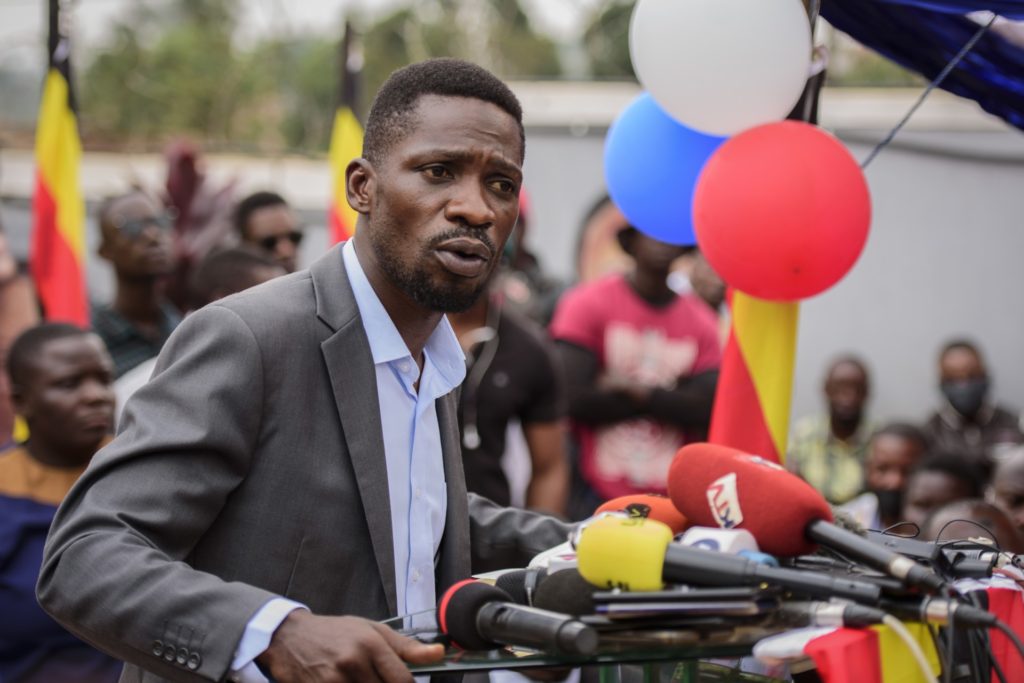
Ugandan opposition figure Bobi Wine, whose real name is Kyagulanyi Ssentamu, speaks at a press conference in Kampala, Uganda, on February 22, 2021. (AP Photo/Nicholas Bamulanzeki)
Museveni’s regime has upheld Marxist ideals and is allied with America’s most formidable foes, most prominently China and Russia. It has nonetheless benefitted significantly from American humanitarian aid. Biden noted in his statement this week that Uganda receives $1 billion in American taxpayers’ dollars a year.
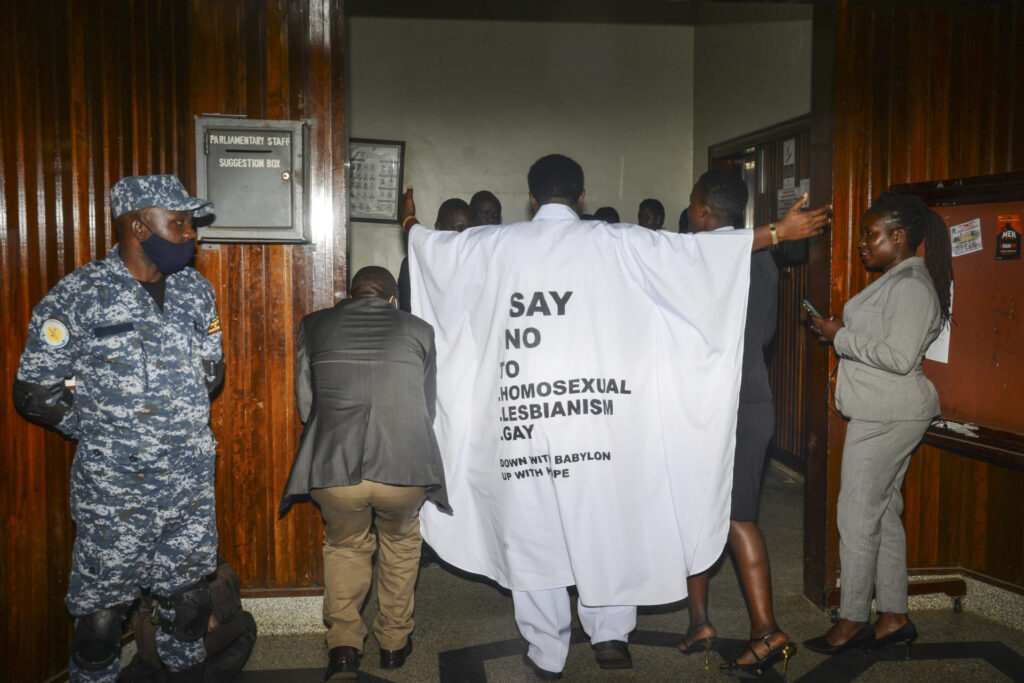
Ugandan MP John Musila wears clothes with an anti-LGBTQ message as he enters the Parliament to vote on a harsh new anti-gay bill, on March 21, 2023. (AP Photo/Ronald Kabuubi)
The “Anti-Homosexuality Act,” passed this week, mandates the death penalty or life in prison for alleged “acts of homosexuality.” Individuals accused of “knowingly promot[ing] homosexuality” can face up to 20 years in prison. “Aggravated homosexuality,” a term used for statutory rape of same-sex children or same-sex activities with a “vulnerable” person, can also result in the death penalty. Human rights activists have expressed particular alarm at the law banning HIV-positive people from engaging in sexual activity and at the “promotion” provision, which could lead landlords to reject LGBT tenants or doctors to reject LGBT patients in an attempt to avoid prosecution.
Uganda’s president has signed into law anti-gay legislation supported by many in this East African country but widely condemned by rights activists and others abroad. https://t.co/8sIHdVhgfu pic.twitter.com/mJlr9aAWMk
— The Associated Press (@AP) May 30, 2023
“We going [sic] to peacefully match to Parliament to deliver our congratulatory message to her and in days to come, to the President,” the leader of the march, identified as Macxzzon Muhwezi, said on Wednesday, according to Uganda’s Monitor newspaper. Muhwezi is a member of the youth league of the NRM, Museveni’s party. The NRM promoted Muhwezi to the chairmanship of its Inter-Party Youth Platform the day before the march.
The Monitor reported that over “100 students from at least 13 universities and higher institutions of learning” partook in the march, though some other reports suggested that over 200 people joined. The newspaper published videos of the crowd, largely made up of men, signing and chanting slogans such as “we don’t want your pro-gay money.”
JUST IN: "We don't want your pro-gay money. We want and love our country more than money," over 100 students from at least 13 universities across Uganda sing as they approach Parliament in a peaceul March "to thank the House and President Museveni for signing the… pic.twitter.com/JYbxkjHxNF
— Daily Monitor (@DailyMonitor) May 31, 2023
The march appeared to come with at least two motorcycle police or military escorts, a sign the Museveni regime approved.
“This is our country and the law will shield our morals, values and culture,” one sign held up by the crowd read. “To hell with homosexuality,” read another.
VIDEO: Must watch scenes as security officials lead and follow more than 100 peaceful student marchers from 13 Ugandan universities as they head to Parliament over the anti-gay law. Organizers of the march say they "are after thanking President Museveni and Parliament for… https://t.co/loC8vr46zN pic.twitter.com/9LNlr81y3R
— Daily Monitor (@DailyMonitor) May 31, 2023
The references to “gay money” appeared to be a rejection of threats by President Biden to cut off HIV-positive Ugandans from live-saving American aid.
“I have directed my National Security Council to evaluate the implications of this law on all aspects of U.S. engagement with Uganda,” Biden announced on Monday, “including our ability to safely deliver services under the U.S. President’s Emergency Plan for AIDS Relief (PEPFAR) and other forms of assistance and investments.”
“My Administration will also incorporate the impacts of the law into our review of Uganda’s eligibility for the African Growth and Opportunity Act (AGOA),” the statement continued.
The threat of withholding HIV/AIDS funding alarmed health experts in Uganda.
“If they stopped funding for even a week, you would see trouble,” Stephen Watiti, the head of the National Forum of People Living with HIV/Aids Networks in Uganda (NAFOPHANU), told the Ugandan Monitor. “You would lose somebody you know, it might not be overnight, because over 90 percent of drugs we have in the country are from these people; [donors like PEPFAR].”
Biden called the Anti-Homosexuality Act a “tragic violation of universal human rights—one that is not worthy of the Ugandan people, and one that jeopardizes the prospects of critical economic growth for the entire country.”
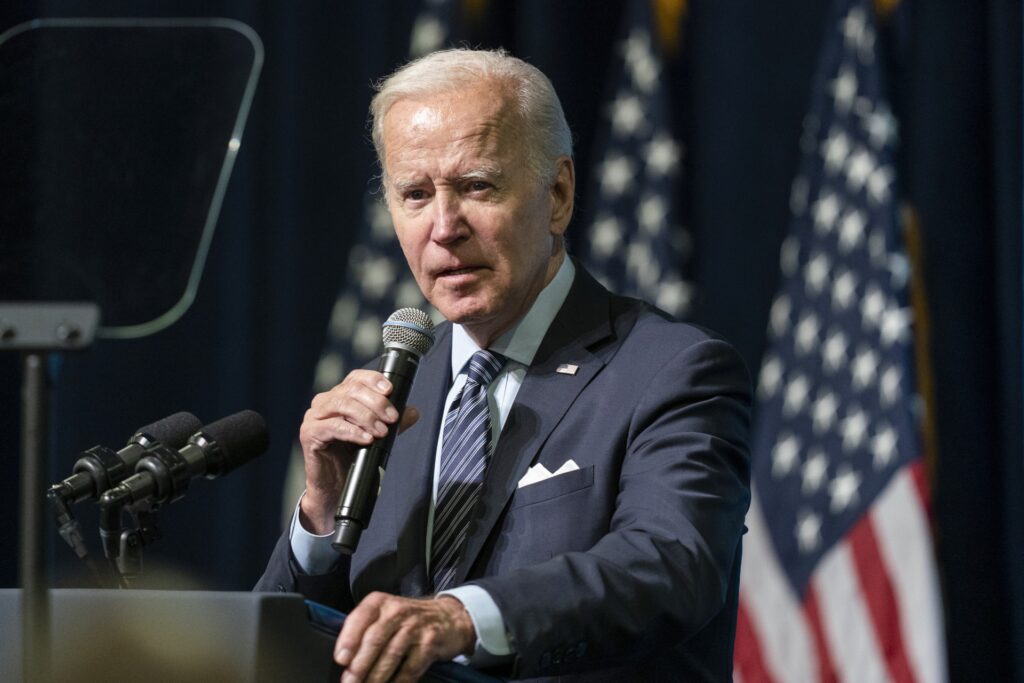
President Joe Biden speaks at a Democratic National Committee event at the Gaylord National Resort and Convention Center, Thursday, September 8, 2022, in Oxon Hill, Maryland. (AP Photo/Alex Brandon)
“This law is going to have dire effects on the economy,” Julius Mukunda, the executive director of the Civil Society Budget Advocacy Group (CSBAG) in Uganda, told the Observer, a national newspaper, apparently agreeing with the Biden statement.
“Half of the national budget is financed through debt. Most of these concessional loans are from the European Union (EU) and the US. This law puts us on the spot whether we have a plan B to finance our national development plan agenda,” he explained. Mukunda told the newspaper that Uganda’s health sector is largely kept afloat by American donations, while most of its exports go to the EU, where anti-LGBT legislation would face the most rejection.
Contrary to the views of the “youth” march on Wednesday, Andrew Karamagi, a Ugandan attorney, told the Observer that he considered the Anti-Homosexuality Act a distraction from the leftist government’s inability to deliver to the people.
“The Ugandan state, in its current degraded situation, cannot effectively implement such a law, to begin with. Ugandans should shun this diversion,” Karamagi said, “and raise the important questions — not who sleeps with whom, and how. Sexual offences are already taken care of by existing laws. No need to dabble in this idle debate.”
RELATED: Sen. Cotton RIPS Kroger CEO for Allegedly Firing Workers Who Refused to Wear Gay Pride Symbol:
Senator Tom Cotton / YouTubeFollow Frances Martel on Facebook and Twitter.
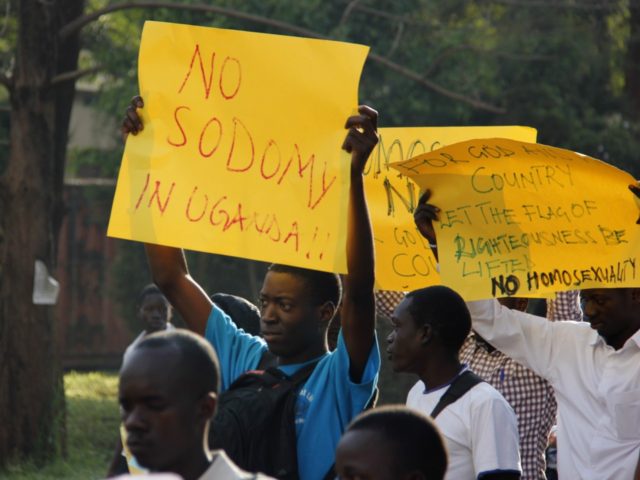
COMMENTS
Please let us know if you're having issues with commenting.